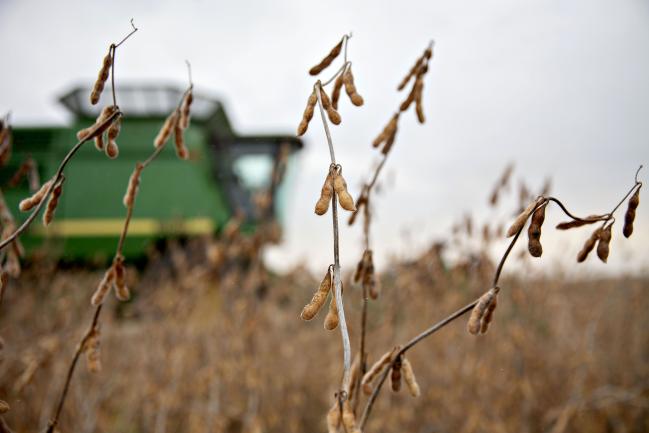(Bloomberg) -- Want to receive this post in your inbox every day? Sign up for the Terms of Trade newsletter, and follow Bloomberg Economics on Twitter for more.
China’s latest gesture of goodwill in its trade war with the U.S. isn’t having much of an immediate effect where it matters most for President Donald Trump: on struggling American farms.
Beijing gave new waivers to several domestic companies to buy U.S. soybeans free of the tariffs China imposed in retaliation for the Trump administration’s higher levies.
The move gave soybean futures in Chicago a little lift initially Tuesday, but prices stayed below their highs of last week.
The muted uptick may be explained partly by the quantity of China’s potential purchases — reportedly between 2 million to 3 million tons, and some firms already bought about 1.2 million tons.
That’s not a huge amount and would look like more normal purchases in the absence of Trump’s tariffs. In the 12 months through August 2017, the last full marketing year before the trade war started, the U.S. exported a total of 36 million tons of soybeans to China.
Meanwhile, Trump gave his Treasury Secretary Steven Mnuchin a bizarre grilling over China’s targeting of U.S. agriculture, adding to the confusion about the short-term goals in the trade negotiations with a Chinese government that doesn’t seem overly worried about the economic fallout so far.
As the U.S. administration tries to figure out how to proceed, this is an opportune moment for China to offer Trump olive branches to keep talks on track.
Next week the Chinese political calendar is packed with events and holidays to celebrate 70 years of Communist Party rule. So there aren’t likely to be any major developments originating from Beijing until the following week, when Vice Premier Liu He is planning to go to Washington for talks with his counterpart, U.S. Trade Representative Robert Lighthizer.
Charting the Trade War
Today’s Must Reads
- Metal fatigue | Europe’s steel industry painted a bleak picture of domestic market conditions, blaming U.S.-instigated tariff wars, Brexit and global overcapacity.
- Car questions | Japan and the U.S. have finished talks on a trade deal with no indication yet on how the two sides responded to a U.S. threat of tariffs on autos and parts.
- Facing competition | The U.S. corn export program is on life support and shippers can’t blame the trade war with China, which has never been a big buyer of the yellow grain.
- Hong Kong pain | Hong Kong’s economic situation continues to darken, with the city’s trade body now expecting exports to shrink this year to the worst levels in a decade.
- Russian fertilizer | The European Union may renew quarter-century-old trade protection on Russian ammonium nitrate, risking a backlash from EU farmers.
- Flirting with recession | German business surveys show factory slump is spreading to services.
- South Korea’s cushion | Fiscal stimulus, Bank of Korea rate cut emerge as trade war defenses
- Sept. 25: CPB’s monthly world trade monitor
- Sept. 26: U.S. advanced goods trade balance for August
- Sept. 24-30: The General Debate of the UN General Assembly
- Sept. 30: Phil Hogan’s hearing to be EU trade commissioner
Don’t keep it to yourself. Colleagues and friends can sign up here. We also publish Balance of Power, a daily briefing on the latest in global politics.
For even more: Subscribe to Bloomberg All Access for full global news coverage and two in-depth daily newsletters, The Bloomberg Open and The Bloomberg Close.
How are we doing? We want to hear what you think about this newsletter. Let our trade tsar know.
